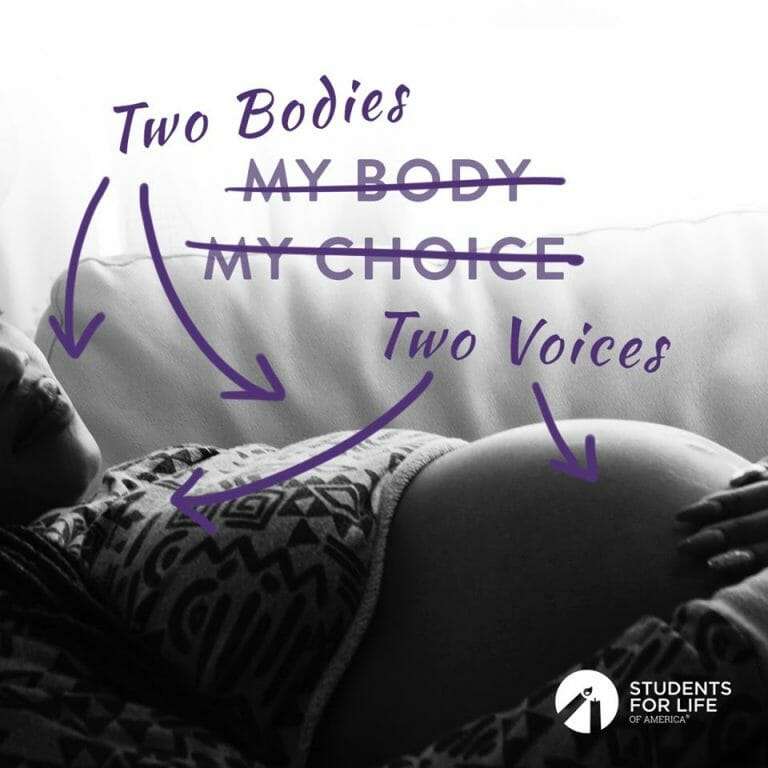Responding to Bodily Rights Arguments
Learn
People who still support abortion even if they accept that it kills a human being almost always do so on the grounds of “bodily rights” or “bodily autonomy.” It’s important to understand the argument for abortion from a bodily rights perspective.
Sometimes, when an abortion supporter says, “My body, my choice,” they mean this only rhetorically, and the concept is easily refuted by explaining that there are literally, biologically, two bodies involved. These are folks who either dozed off during high school science class or are exceedingly desperate for justification of abortion who try to make the case that the zygote/embryo/fetus is a biological part of their mother’s body.

Babies Aren't Organs
For pro-lifers, all this takes is a quick explanation. For example, the preborn child has different DNA, possibly a different sex or blood type, and fits all other criteria for existence as a distinct organism. Pointing out where a gestating child differs from an actual bodily organ, like a pancreas, can be useful. An organ is a specialized group of tissue that performs a certain function for the organism’s body. It cannot do so without the instruction of the mother’s brain. However, a preborn baby, from the moment of conception, is self-directed. He/she is not serving the mother’s body like an organ, and the mother’s brain is not directing the growth.
But that’s pretty obvious. Instead, most of the time what people mean when they argue for "bodily autonomy" is one of two things. Either 1) they view the woman as a Sovereign Zone, or 2) they think she should have the Right to Refuse. These are more sophisticated arguments, but we’ll walk through them both. You will need to ask the person you are talking with questions to determine which camp they fall into.
The Sovereign Zone Argument
In this viewpoint, the idea is that the woman’s body is a “sovereign zone” over which she has complete and total jurisdiction. No one can impose limitations on her sovereignty, regardless of whether it harms others. Most people think they believe this, but when you draw out the concept a bit, they get uncomfortable with the ramifications.
Most pro-abortion people are reasonably well-intentioned and not out for blood. If you press them for how far they think a woman’s bodily autonomy stretches, they realize they don’t really think the woman should be able to do anything to the child. In this type of dialogue, you can start trying to find some common ground by sharing situations or analogies that most people disagree with.
What do they think about…
- Late-term abortion?
- Gendercide?
- Abortion just for an art project?
- Mother doesn’t want a scar from a c-section?
If these examples sound far-fetched, here's a real-life one: Melissa Ann Rowland in Salt Lake City in 2004 refused an emergency C-section for her twins because she didn’t want a scar. She went outside to have a cigarette, came back in, and finally after hours of begging by physicians, she consented. By the time doctors were able to get to her babies, one had died and the other was born barely alive and addicted to cocaine. She was charged for murder.
If the pro-abortion person says that the mother has absolute autonomy over her body, there’s then nothing wrong with what Rowland did in the story above. However, if they admit that there is something that a woman cannot do to her preborn child, the sovereign zone argument falls apart.
Aggressive Analogies
Unfortunately, there are a lot of pro-abortion students who are either deliberately trying to push your buttons or actually morally depraved. If the material above didn’t do the trick, you may need to use a more extreme analogy to find their limits.
Before you give any analogy (also known as a “thought experiment”), it’s important to get the person you are talking with to go along with you in the analogy - so you need a clear transition and an acknowledgement that they understand you’re telling a story. It can be as simple as saying, "I have a funny thought experiment for you. It may seem odd at first, but hang with me…"
Thalidomide Analogy
- Thalidomide is a drug that was given to pregnant women decades ago to help prevent morning sickness. The doctors administrating the drug quickly learned that it had the side-effect of causing SEVERE birth defects (the children were almost always born without limbs). Thus, thalidomide is no longer used to prevent morning sickness. However, for the sake of our analogy, say a woman wants to take the drug anyway, even though she knows it will cause deformity. Should she be allowed to do that?
If someone supports abortion on the grounds that the woman’s body is a type of “sovereign zone” where she may do whatever she wants with no regard to the other person inside of her, that person must also support the use of thalidomide if the woman so chooses. If they hold to their viewpoint that it would be okay for the woman to take Thalidomide to treat morning sickness, you can make the analogy a little more uncomfortable by asking this question:
- What if she just wants to use Thalidomide to purposefully deform the child? What if a woman chooses to take Thalidomide to torture and deform the child as revenge against an unfaithful husband or partner? Should that be legal?
If not, a woman really isn’t a sovereign zone. If so, the person has bitten a very morally dubious bullet, and it’s totally reasonable to call them out on that. The next step in this case is to ask if torture is permissible for born people and walk it back then to Apologetics 101 about why preborn humans are equal to born humans.
Click here to learn more about Right to Refuse arguments.
Still have questions?
Request a Pro-Life Apologetics Training from your SFLA Regional Coordinator by emailing [yourstate]@studentsforlife.org.
